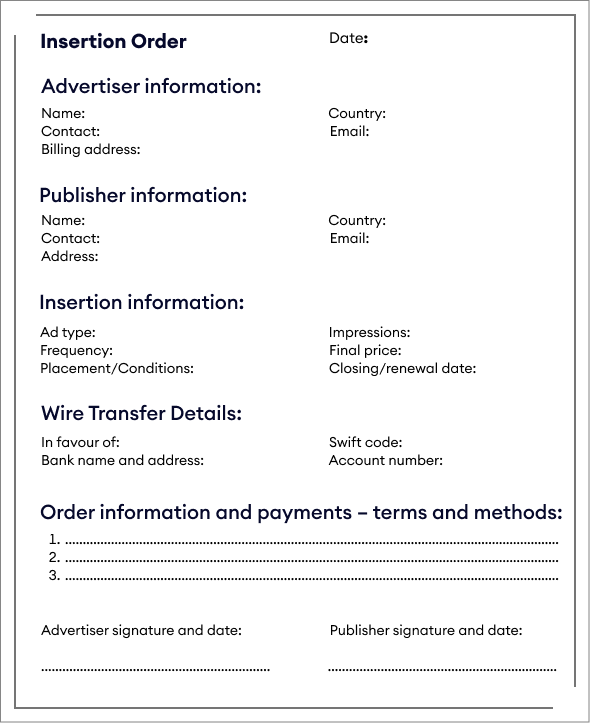
One of the key advantages of a carefully signed agreement is that it can help avoid potential disputes and safeguard all parties involved in the event. In the world of ad monetization, Insertion Orders are a prime example of such agreements. If you’re looking to pursue direct deals, it’s essential to familiarize yourself with IO and its role in safeguarding your interests.
What is an Insertion Order
Simply speaking, an Insertion Order (IO) is a signed agreement between a publisher and an advertiser. It’s worth signing it to specify the terms of the ad campaign and to avoid problems and misunderstandings in the future. It can be done online or in person, prepared by a publisher, advertiser, or agency. Insertion Orders are applied when using direct deals (where a specific number of impressions of a given advertising campaign is sold at a set price). On the contrary, in the case of a different efficient monetization method – programmatic – there is most often no need for such contracts because everything is done automatically. What’s vital, programmatic is a broad term that encompasses both auction-based models, such as real-time bidding (RTB), which includes subtypes like the open marketplace and private marketplace, and non-auction model – programmatic direct, where deals are negotiated directly but executed automatically through a platform. In some cases, particularly with Programmatic Guaranteed deals, an Insertion Order may still be required to formalize the agreement, but IOs are often automatically generated and accepted via a platform. However, Insertion Orders are the best option (or sometimes even required) in case of premium campaigns, high-budget agreements, and as mentioned before, in direct deals.
What are the benefits of Insertion Order?
For publishers:
- The specific terms and conditions of the contract are solely between you and the advertiser, which allows for a certain level of flexibility in customization. Through negotiations, a mutually beneficial agreement can be achieved;
- IO protects you from ad fraud, as the agreement legally binds both sides;
- If the Insertion Order is precise, it leaves no room for coincidence. It means it’s protecting you from misunderstandings and any consequent disagreement in the future;
- Assuming everything proceeds as intended, IO may result in establishing a long-term ad partner relationship. Building mutual trust based on experiences can even result in more favorable terms for the agreements concluded in the future.
For advertisers:
- Insertion Orders give advertisers power over where, when, and how their ads appear and other vital details like exact formats etc.;
- IOs bring transparency and order to ad campaigns, ensuring all parties involved are on the same page.
What are the drawbacks of an Insertion Order?
For publishers:
- An IO is a legally binding document, which means that even if it contains some unfavorable provisions, they must be followed, or there will be consequences. It is not possible to change your mind midway through if you decide that the generated ad revenue is not satisfactory;
- It’s hard to sell all the impressions only through direct deals, especially when you have many visitors. It’s much better to mix a direct deal with other monetization solutions.
For advertisers:
- Preparing IOs is time-consuming, it requires manual oversight and coordination;
- There’s a risk advertisers might be bound to a deal, despite the fact that the campaign might not perform well.
It’s a known fact that the whole process of preparing an Insertion Order can take a long time because of negotiations and agreement preparations. If you’re looking for faster solutions, you might want to give programmatic a try – in this case, everything happens in the blink of an eye!
Insertion order best practices for publishers
- Take your time during negotiations. It’s better to potentially “waste” some time during preparations than deal with consequences later, like outcomes of technical issues or impression discrepancies that might be a source of billing disputes;
- That being said, it’s always a good idea to be prepared for any potential issues by anticipating what could go wrong. For instance, it’s important to include a refund or compensation policy in case of any technical errors that may prevent ads from being served;
- If you are unsure about any aspect of an Insertion Order, it is always a good idea to seek advice from an attorney or agency. People with prior experience in dealing with such agreements can help you identify any potential issues or highlight conditions that you may have overlooked or considered insignificant. By doing so, you can ensure that the IO is more advantageous and safer for you. Remember, it’s better to be safe than sorry;
- Verify thoroughly your IO – make sure it doesn’t contain formal errors, and additionally, the contract is specific, for instance, in budget or ad placement matters. It should include a precise definition of ad placement (like homepage top banner), KPIs, campaign dates, and budgets;
- Compare the average price in the contract for displaying an ad with what you get, for instance, in programmatic deals. Your decisions regarding the future should be based on historical data. In other words, make sure that the contract is beneficial in your particular case;
- Include all the necessary information, such as billing details (you will find more details about this in the next paragraph), and ensure all the data is correct;
- Always read the contract twice before signing it, double-checking has never harmed anyone. Take a closer look at all the conditions, dates, numbers, names, addresses, and contact information;
- The final step is to find a safe place to store the copy of your IO, if a need arises, you must be able to access it easily.
Insertion Order template
It’s worth noting that IO may vary depending on the preferences and needs of the parties involved. Nevertheless, there are certain details that both parties should ensure are included:
- Necessary contact information of the publisher and advertiser (like names, e-mails, phone numbers, and addresses);
- Budget for the whole advertising campaign, and also price for individual impressions;
- Ad units’ dimensions;
- Impression number;
- Billing details;
- Possible refund or compensation policy if something goes wrong;
- Start and end date of campaign;
- Name of the campaign.
Here you can see a template of an Insertion Order:

Learn more, gain more!
While direct deals remain relevant in modern monetization strategies, it’s programmatic the most often chosen. If you like the transparency of direct deals, the smartest decision might be to apply both methods! In fact, optimal results may arise from a fusion of these two. However, keep in mind that not everyone can allow themselves to conclude direct deals, as it’s not suitable for all types of content (due to, for instance, its main subject or size, it might not always be easy to find an advertiser willing to make a deal directly).
P.S. There’s also a kind of mashup between programmatic and direct deals – find a minute to see what programmatic direct is!

